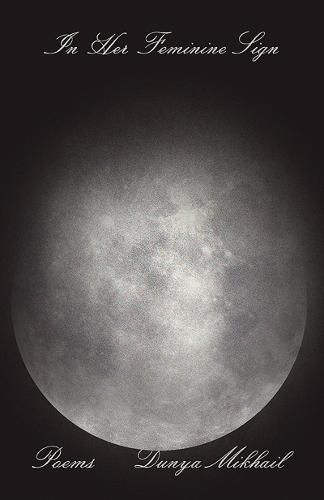Readings Newsletter
Become a Readings Member to make your shopping experience even easier.
Sign in or sign up for free!
You’re not far away from qualifying for FREE standard shipping within Australia
You’ve qualified for FREE standard shipping within Australia
The cart is loading…






In Her Feminine Sign follows on the heels of Dunya Mikhail’s devastating account of Daesh kidnappings and killings of Yazidi women in Iraq, The Beekeeper. It is the first book she has written in both Arabic and English, a process she talks about in her preface, saying The poet is at home in both texts, yet she remains a stranger. With a subtle simplicity and disquieting humor reminiscent of Wislawa Szymborska and an unadorned lyricism wholly her own, Mikhail shifts between her childhood in Baghdad and her present life in Detroit, between Ground Zero and a mass grave, between a game of chess and a flamingo. At the heart of the book is the symbol of the tied circle, the Arabic suffix taa-marbuta-a circle with two dots above it that determines a feminine word, or sign. This tied circle transforms into the moon, a stone that binds friendship, birdsong over ruins, three kidnapped women, and a hymn to Nisaba, the goddess of writing. A section of Iraqi haiku unfolds like Sumerian symbols carved onto clay tablets, transmuted into the stuff of our ordinary, daily life. In another poem, Mikhail defines the Sumerian word for freedom, Ama-ar-gi, as what seeps out / from the dead into our dreams.
$9.00 standard shipping within Australia
FREE standard shipping within Australia for orders over $100.00
Express & International shipping calculated at checkout
In Her Feminine Sign follows on the heels of Dunya Mikhail’s devastating account of Daesh kidnappings and killings of Yazidi women in Iraq, The Beekeeper. It is the first book she has written in both Arabic and English, a process she talks about in her preface, saying The poet is at home in both texts, yet she remains a stranger. With a subtle simplicity and disquieting humor reminiscent of Wislawa Szymborska and an unadorned lyricism wholly her own, Mikhail shifts between her childhood in Baghdad and her present life in Detroit, between Ground Zero and a mass grave, between a game of chess and a flamingo. At the heart of the book is the symbol of the tied circle, the Arabic suffix taa-marbuta-a circle with two dots above it that determines a feminine word, or sign. This tied circle transforms into the moon, a stone that binds friendship, birdsong over ruins, three kidnapped women, and a hymn to Nisaba, the goddess of writing. A section of Iraqi haiku unfolds like Sumerian symbols carved onto clay tablets, transmuted into the stuff of our ordinary, daily life. In another poem, Mikhail defines the Sumerian word for freedom, Ama-ar-gi, as what seeps out / from the dead into our dreams.